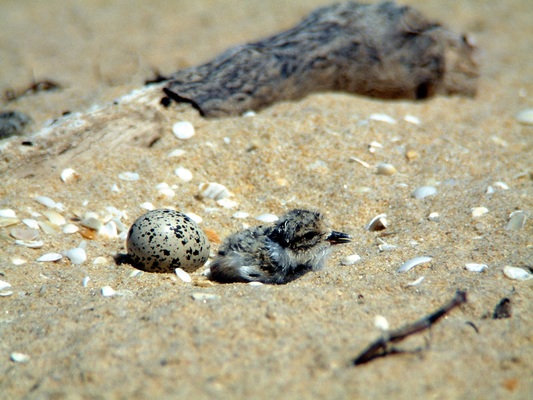An endangered shorebird chick dumped dead with dog faeces in a Barwon Heads bin has enraged ecologists who are trying to save the species.
A tracking device fitted to the rare hooded plover led the team to its grisly discovery at a 13th Beach entry point, said project leader Tom Schmidt.
A dog mauled the flightless chick before the dog’s owner tried covering up the incident, he suspected.
The discovery left the team in “utter shock”, Mr Schmidt said.
“We knew the signal was coming from the bin, so we had to scan each item in the bin to locate the chick.
“The whole time I was thinking to myself that this must be a mistake, how could a small flightless chick of a threatened species end up in a bin?
“The tiny body was tied into a bag containing dog faeces and the injuries were consistent with dog attack. Internal organs protruded and a second bag was used, apparently to conceal the evidence.”
Mr Schimdt and fellow Deakin University team members were radio-tagging hooded plover chicks to recover any dead birds for “post-mortem inspection”, he said.
“From the bodies we found we determined dog and bird attacks were the lead candidates as causes of death.”
Mr Schmidt urged Victorian beachgoers to “leash their pets” as the hooded plover struggled to survive as a species.
Deakin wildlife and conservation biology Associate Professor Mike Weston described the plover chicks as defenceless “balls of fluff”.
“The battle to save threatened shorebirds which breed on our beaches rages every spring and summer as thousands of Victorians and their dogs enjoy time at the beach, and the birds desperately try to breed,” he said.
“Sadly, the chances of surviving from hatching to the age at which they can fly, a mere 30 days, are so low that chick death is considered a major conservation problem.”
The “shameful act” at Barwon Heads demonstrated the role of unleashed dogs in the demise of the hooded plover, Prof Weston said.
“This is not a trivial matter. Beachgoers must obey the prevailing rules and regulations, particularly the leashing laws.
“Responsible dog ownership on beaches means that dogs should not be able to hunt and kill birds or other wildlife.
“Our philosophy has always been to find solutions to promote coexistence, to share the beach, with restrictions as a last resort.
“The dog walking community on our beaches needs to rise to the challenge – we need them to help save this species.”
Tagged rare chick ‘killed, dumped in 13th cover-up’

Digital Edition
Subscribe
Get an all ACCESS PASS to the News and your Digital Edition with an online subscription
East Belmont and North Geelong to meet in A Grade final
North Geelong won its way through to the Geelong Cricket Association women’s A Grade grand final and will play East Belmont on Sunday 8...








